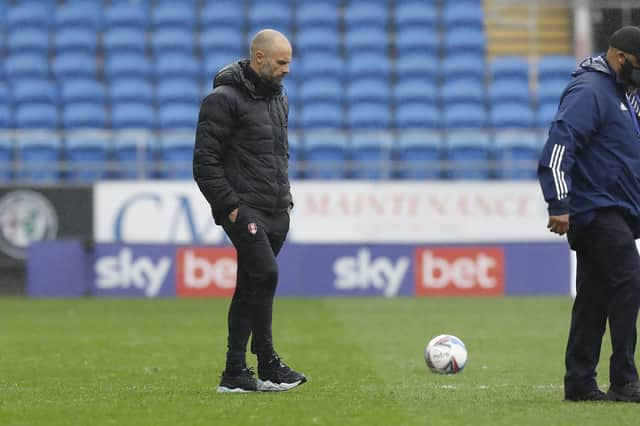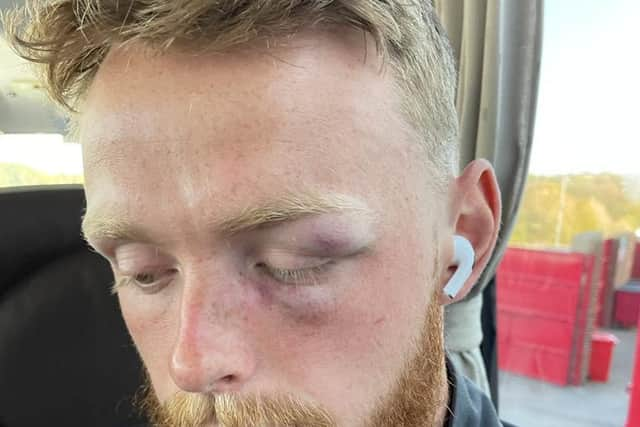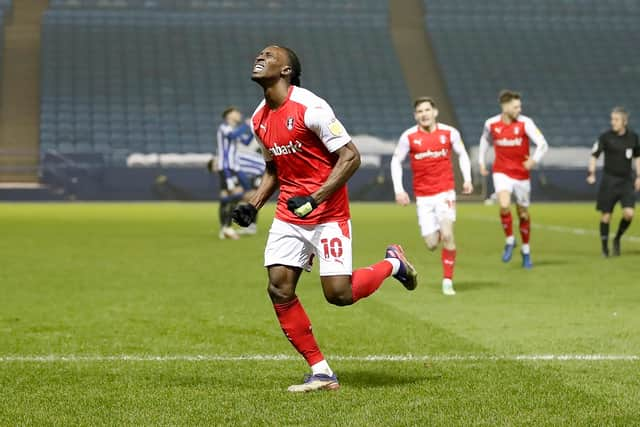Injuries, coronavirus, that run-in, all those chances, damn refs and Hillsborough and the 97th minute .... Rotherham United and the story of a Covid relegation


‘Just one more case in the latest testing. Me.’
Manager Paul Warne was letting me know that he’d become the 19th victim of a Covid outbreak sweeping through the Rotherham United first-team camp in March.
There’d also been number of casualties earlier in the campaign and the Millers were being attacked from all angles as they fought for their Championship lives.
Advertisement
Hide AdAdvertisement
Hide AdCoronavirus, injuries, a raft of refereeing errors, even the weather were all sniping away at their chances of staying up on finances more suited to the division below.
In the end, the second-lowest budget brought them the second-lowest place, but this wasn’t a year of failure, this was a year of fighting against the odds, a year of committed men giving everything, a season when Warne and his group came within six minutes of a career-defining survival feat.
Playing their 12th match in 37 days, they led 1-0 late on at Cardiff City where a final-day victory would see them safe.
“We fell just short,” said Warne, without bitterness or recrimination but with utter desolation after Marlon Pack’s equaliser last Saturday.
Advertisement
Hide AdAdvertisement
Hide AdThe first four games brought only one defeat and Rotherham looked capable of securing their second-tier status for the first time in three attempts since 2016.
Then Chiedozie Ogbene went down long-term injured, as did Clark Robertson, and Kieron Sadlier, Shaun MacDonald, Joe Mattock and Jamie Lindsay all followed.
Everything that could conspire against the luckless Millers was doing.
Covid first reared its head in December, forcing Derby County and Middlesbrough postponements, then returned three months later to provoke Brentford, Luton Town and Coventry City rearrangements.
Advertisement
Hide AdAdvertisement
Hide AdIn between, snow and freezing temperatures came calling at AESSEAL New York Stadium and that was Cardiff and QPR also to be squeezed into a programme worryingly short of spare dates.
“I feel like I’ve run over a black cat,” said Warne.
Referees blew as cold as the New York weather, penalties at Swansea City and QPR not being given and two at home to Cardiff glaringly obvious to everyone except the official.
Reading and Nottingham each left with three points after offside winners, then came Darren Bond and Gavin Ward.
Bond, not content with a duff dismissal of Michael Smith that had to be rescinded seven weeks earlier, produced a straight red when Matt Crooks, whose eyes never left the ball, was caught in an accidental head clash with Boro’s Grant Hall.
Advertisement
Hide AdAdvertisement
Hide AdWard decided that a second-minute elbow in the eye of goalkeeper Viktor Johansson that left the young Swede with concussion was legal and culprit Carlton Morris’ early winning goal in a contest otherwise dominated by Rotherham was allowed to stand.


Eye-socket damage for Viktor Johansson at Oakwell
“I feel like I’ve run over a black cat,” Warne repeated.
Recruitment, always difficult in the Championship on what the Millers are prepared to spend, proved to be a mixed bag, Johansson and wing-back Wes Harding enjoying stellar first seasons but winger Sadlier failing to nail down a starting role and wide man Mickel Miller being allowed to go out on a League One loan.
The Millers needed their loans to come good and not all of them did. Keeper Jamal Blackman cost them points before Johansson replaced him, winger Florian Jozefzoon’s contribution was sporadic and striker George Hirst — unproven but thought to be full of potential — left after 32 outings with as many senior goals in English football as he’d arrived with: none.
Bucking the trend were the only two January arrivals, wing-back Ryan Giles, with pace and a bit of magic in his feet, and midfielder Lewis Wing who added craft, graft and plenty more to the midfield.
Advertisement
Hide AdAdvertisement
Hide AdNineteen single-goal defeats — 13 of them by 1-0 margins — tell of Rotherham’s competitiveness.
If only winning positions in stoppage time at Birmingham and at home to Huddersfield hadn’t been thrown away and they’d held on for draws in the last few seconds against Norwich at New York and versus Blackburn at Ewood Park.
Home results — 14 defeats in 23 matches — let them down and fans can’t come back soon enough.
My phone pinged and this time Warne, a man partial to an emoji, was signing off with a grumpy face.
Advertisement
Hide AdAdvertisement
Hide AdA third successive March game was about to fall to Covid and the manager knew full well the fixture chaos that all this was leading up to.
The season was already shortened by a month and now the Millers were facing a run-in that no side could cope with: a match every three days for more than a month or, put another way, nearly a quarter of the season being crammed into the last five weeks.
Richard Wood, given a new lease of life in the centre of a back three when the dearth of wingers saw a switch from 4-4-2 to 3-5-2, describes that frantic, frenetic, unfair schedule as the biggest single factor in the club’s relegation.
“It was just crazy,” the captain said. “We put all we had into every game but there was just no chance to recover properly. Who knows what would have happened had we just been one per cent sharper.”
Advertisement
Hide AdAdvertisement
Hide AdRotherham, having been averaging a point a game for seven months, took seven in those last 12 matches.
‘The Week of Death’ saw them play four times in nine days, including losing 1-0 to survival rivals Coventry and Birmingham City in a 72-hour spell that did as much as anything to settle their fate.
Warne, like his men, fought with everything he had, a boss invested in the Millers with such emotional intensity that it’s hard to contemplate manager and club without each other.
By the final minute of the final match, he was spent, utterly spent, a good man broken to the point that he went away in real need of the wound-licking break that will safeguard his health and sanity.
Advertisement
Hide AdAdvertisement
Hide AdThe highs of a roller-coaster season were the first home league victory over Sheffield Wednesday for 40 years, Freddie Ladapo’s 97th-minute winner at Hillsborough, the destruction of Neil Warnock’s Middlesbrough at the Riverside Stadium and the 2-0 triumph at Bristol City that suggested safety was very much on before hopes and legs flagged during that crazy countdown.


Freddie Ladapo. Hillsborough. The 97th minute
The Viking emerged in goal, Wes was wonderful and Crooks and Lindsay ran so much that they got to know the New York pitch as well as groundsman Dave Fellowes.
The lows were not turning up at Coventry City, conceding three at home to Wycombe Wanderers in a defeat that damaged morale, referee Bond believing an epilepsy sufferer would use his head to launch a deadly airborne attack on an opponent and the FA shielding one of their own by upholding Crooks’ three-match ban.
Somewhere in all this, 50-year-old Wood, who plans to wear the armband until he’s 100, was deservedly earning a new contract.
Advertisement
Hide AdAdvertisement
Hide AdFor all the many things outside their control that went against them, Rotherham have to look at themselves in a certain area: the opposition’s penalty one, to be precise.
Two years ago they wanted for nothing in spirit and courage in their fall from the Championship but, fundamentally, lacked the quality to stay up.
This time around, they had it in them to survive. Points were there to be taken had just a portion of their chances been put away.
Some of that comes down to finances as bigger bucks buy better finishers. A cost-neutral January was a sensible fiscal approach in a season when Covid robbed the club of matchday income but it cost Warne added firepower at a crucial time.
Advertisement
Hide AdAdvertisement
Hide Ad“We haven’t had a cutting edge,” Warne acknowledged. “I don’t think there were many games where Rotherham fans, or neutrals even, thought we definitely deserved to lose. We just didn’t have that little bit of sugar when we needed it.”
Michael Smith’s penalty miss at Millwall after the final international break cost them momentum while Ben Wiles had to score a last-gasp back-post winner in a six-pointer at Huddersfield Town but didn’t.
Ladapo, a yard out, turned into the fresh-air prince of Oakwell and Wing should have ended the contest at the City of Cardiff Stadium before the Bluebirds’ gut-wrenching leveller.
The hurt will eventually subside as supporters turn bright eyes towards an opening-day August return to New York and an inevitable summer rebuild begins to take shape.
Advertisement
Hide AdAdvertisement
Hide AdThe loan lads have left, several players are out of contract and won’t be offered new deals, prized asset Crooks has probably played his final match and Smith, with Championship admirers, may also move on and fringe men will likely depart in search of more game-time.
Nearly all of us hope that Warne, the yo-yo man who has taken the Millers up or down in all of his five seasons, decides he has the appetite to push for promotion number three.
Meanwhile, farewell, 2020/21, and all the curses you brought with you.
The drama of Cardiff was almost too much to bear as Rotherham spurned a glut of opportunities and the final curtain fell on the wrong side of another heroic attempt to establish a foothold in the second tier.
Advertisement
Hide AdAdvertisement
Hide AdThe Championship story of the Millers encapsulated in one game yet again.
Thus a campaign of illness and injury, a season of desire and dashed hope, a year of wrongful refs and Rotherham coming so near yet so far drew to a heartbreaking close.
All it had lacked was that cutting edge the manager talked of. And a last-day text with a smiling-face emoji.
**************************
THE SKIPPER'S VIEW
CAPTAIN Richard Wood believes the packed end-of-season fixture programme cost Rotherham United their place in the Championship.
Advertisement
Hide AdAdvertisement
Hide AdThe Millers were forced to play 12 times in the last 37 days of their campaign because of all the games postponed through Covid or the weather earlier in the campaign.
“The schedule definitely played the biggest part,” the skipper said. “It could have been so different if we’d been fresher in the final weeks.
“So many games in such a short space of time took the edge off us.
“We still ran, we were still fit and we still gave everything we had, but it would have been interesting to see how we performed had we had the same amount of rest as the other teams.
Advertisement
Hide AdAdvertisement
Hide Ad“Birmingham City came to our place on a Sunday and had had eight days to get ready for it. We had played on the Tuesday and the Thursday in between. We’d have loved a week off, like them, to train properly and prepare right.
“All the missed chances didn’t help us either.”